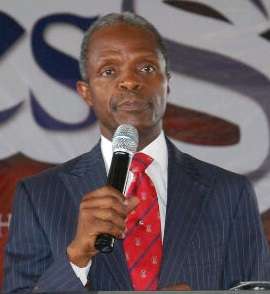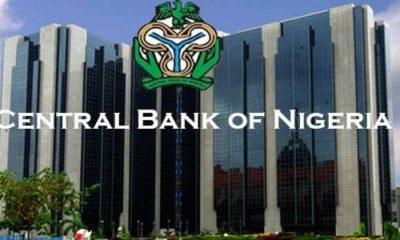Finance
CBN will ease forex restrictions in the future –Osinbajo

ABUJA-NIGERIA will keep foreign currency restrictions for now to preserve the country’s currency reserves amid falling oil revenues but the Central Bank of Nigeria will ease the rules in the long-term, Vice President Yemi Osinbajo has said.
The current “restrictions are definitely short term. There is no question about that,” Reuters quoted Osinbajo as telling reporters late on Saturday.
“So, long term, we expect that the CBN will ease restrictions as we go along.” He added.
 The CBN Governor, Mr. Godwin Emefiele, had defended its decision to tighten foreign exchange controls by excluding 41 items from the interbank forex market a few months ago.
The CBN Governor, Mr. Godwin Emefiele, had defended its decision to tighten foreign exchange controls by excluding 41 items from the interbank forex market a few months ago.
According to a statement by the CBN, the country spends an estimated N1.3tn annually on items that could be manufactured locally.
Emefiele maintained that the huge amounts of money Nigeria was spending on importing things that could be produced locally had become a significant drag on the nation’s foreign exchange reserves.
But the Lagos Chamber of Commerce and Industry and other market analysts warned that the policy could lead to the closure of many factories.
They also noted that the policy had caused considerable pressure on the Bureau de Change segment of the market and also widened the gap between the official and parallel forex markets.
United States lender, JP Morgan, had last month expelled Nigeria from its Government Bond Index-Emerging Market over issues relating to lack of transparency in the nation’s forex market.
Meanwhile, yields on Nigerian bonds are seen dropping across the board this week in anticipation of increased liquidity in the banking system from retired Treasury bills and refunds from cash reserve requirements.
“The market is very liquid now because of the injection of cash from matured treasury bills and expectations of additional liquidity from the CRR refunds by the CBN,” one dealer told Reuters.
The CBN had said it would inject an additional N300bn ($1.5bn) into the banking system after it cut the cash reserve requirement to 25 per cent from 31 per cent about two weeks ago.
“Pension funds and banks are expected to rev up buying of fixed income assets this week because of the increase in available cash in the system,” another dealer said.
Yields on the benchmark 2024 paper rose to 15.12 per cent on Friday from 14.74 per cent the previous week, while the longest tenor paper rose to 15.04 per cent against 14.97 per cent.
Dealers expected the yields to fall below 15 per cent this week when more liquidity hits the banking system.
Yields on Kenyan Treasury bills are expected to keep rising, but at a slower pace, due to rising interest rates which are attracting foreign investors to Kenyan assets and to improved subscription levels, according to Reuters.
The central bank will auction 91-day, 182-day and 364-day Treasury bills worth a total 12 billion shillings ($115m) in two sales this week.
“We forecast Treasury bill yields are beginning to reach their peak as foreign investors pile in, giving the recent shilling strength more momentum,” a fixed income trader at Kestrel Capital, Alex Muiruri, said.
Business
Nigeria pays US$4.9 billion on petrol subsidy in 2024- NNPCL
It was however noted by Biztellers.com.ng, that although subsidy is back in effect, the main reason for that is the increasingly weak state of the Naira and the country’s extreme dependence on products importation. Also unlike the previous subsidy era, where several oil marketers were getting free subsidy refunds for unverified product importation, this subsidy era is witnessing only one importer, the NNPCL, which in effect is the sole receiver of government subsidies.
Yemie ADEOYE
INSPITE of the official position of the Nigerian government that the controversial petrol subsidy is gone for good as announced by the President on assumption of office, the state owned Nigerian National Petroleum Corporation Limited, NNPCL has disclosed that petrol subsidy is still fully operational in Nigeria, although, under a different identity.
Umar Ajiya, Chief Financial Officer at the NNPCL, disclosed that it cost the company a staggering N7.8 trillion (US$4.9) to cover this price gap in the first seven months of 2024.
Rather than simply referring to these claims as subsidies, he stated that the company is merely managing the price difference in petrol imports on behalf of the federation, stressing that this should not be misconstrued as a return to subsidy payments.
![]() This revelation has reignited discussions on whether the NNPC is indirectly offering subsidies, a concept typically defined as selling a product below its cost price.
This revelation has reignited discussions on whether the NNPC is indirectly offering subsidies, a concept typically defined as selling a product below its cost price.
Documents reviewed by Biztellers.com.ng showed that the term “subsidy” was used extensively in official correspondence between the NNPCL and the presidency, particularly in reference to the “shortfall.”
Recall that President Bola Tinubu reportedly approved NNPC’s request to utilize the 2023 final dividends due to the federation to offset these costs.
However, during a media briefing on Monday about the company’s 2023 audited financial statements, Ajiya refuted claims that the NNPC is involved in any subsidy scheme.
Ajiya further disclosed that the Nigerian government owes the NNPC N7.8 trillion ($4.9 billion) in subsidy-related debts for the period from January to July 2024.
In furtherance of his clarification to the News Agency of Nigeria (NAN), Ajiya insisted that no subsidy payments have been made to any marketer in the last nine years, citing the NNPC’s role as the sole importer of petrol under supply contracts.
He said, “In the last eight to nine years, NNPC Ltd. has not paid anyone a dime as a subsidy; no kobo has been disbursed by NNPC Ltd. in the name of subsidy. No marketer has received any payment from us for subsidy.”
“What has been happening is that we have been importing PMS, which has been landing at a specific cost price, and the government tells us to sell it at half price. So the difference between the landing price and that half price is a shortfall.
“And the deal is between the Federation and NNPC Ltd., to reconcile, sometimes they give us money, so there is no money exchanging hands with any marketer in the name of subsidy.”
Ajiya remained silent on how much of the $4.9 billion could have been remitted to the federation account if the NNPC had not been covering the “shortfall.”
It was however noted by Biztellers.com.ng, that although subsidy is back in effect, the main reason for that is the increasingly weak state of the Naira and the country’s extreme dependence on products importation. Also unlike the previous subsidy era, where several oil marketers were getting free subsidy refunds for unverified product importation, this subsidy era is witnessing only one importer, the NNPCL, which in effect is the sole receiver of government subsidies.
Banking
CBN Denies Currency Devaluation

The Central Bank of Nigeria (CBN) has refuted claims of devaluing the.
Earlier reports suggested that the CBN had devalued the Naira, lowering its exchange rate from N631 to the dollar, compared to the previous day’s rate of N461.60 at the Importers and Exporters (I&E) window.
However, the Central Bank of Nigeria (CBN) released a statement on Thursday through its Acting Head of Corporate Communications, Dr. Isa Abdulmumin, categorizing the report as false information.
In the statement titled ‘CBN Has Not Devalued The Naira’, he said the attention of the apex bank was drawn to the news report by an Abuja based newspaper edition of June 1, 2023, titled “CB Devalues Naira To 630/51”.
However, the CBN stated categorically that the news report was replete with outright FALSEHOODS and destabilizing innuendos, ‘reflecting potentially willful ignorance of the said medium as to the workings of the Nigerian Foreign Exchange Market.’
“For the avoidance of doubt, the exchange rate at the Investors’ & Exporters (I&E) window traded this morning (June 1, 2023) at N465/USS1 and has been stable around this rate for a while.
“The public is hereby advised to ignore the news report by Daily Trust in its entirety, as it is speculative and calculated at causing panic in the market,” the CBN spokesman added.
He, therefore, advised media practitioners to verify their facts from the Central Bank of Nigeria before publishing in order not to misinform the public.
Banking
BREAKING: CBN Increases Interest Rate By 0.5%

The interest rate in Nigeria has been raised to 18.5 percent, up by 0.5 percent, from 18 percent where it was pegged in March 2023.
The Central Banks of Nigeria’s (CBN) Monetary Policy Committee (MPC) resolved to this effect at its third meeting of 2023 in Abuja, on Wednesday.
Governor, CBN, Godwin Emefiele, made the disclosure in the communiqué of the MPC’s meeting, thereafter.
While engaging the media at the end of the two-day meeting, Emefiele, said the committee voted to keep the asymmetric corridor at +100 and -700 basis points around the MPR.
In the view of the MPC, rising inflation rate is traceable to the high energy cost and challenges around the supply chain, among others, which lie outside the corridors of the CBN.
Emefiele said, “The current trend in price development would continue to be monitored by the bank with greater collaboration with fiscal authority to address the drivers of inflation.”
Biztellers reports that the CBN had effected six consecutive interest rate increases, which has seen the rate move from 11.5 percent in March 2022 to 18.5 percent in May 2023.

















